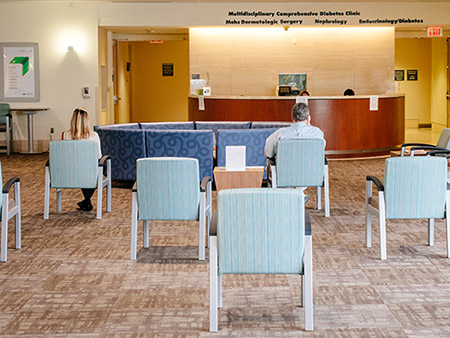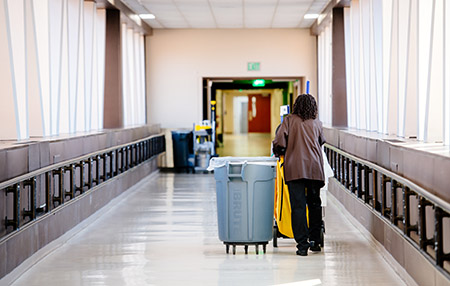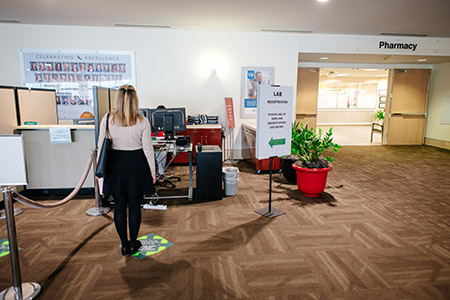 Photography: Steve WoodCOVID-19 has brought many changes to the ways people go about their everyday lives. That rings true for the medical experiences that most have had in the past. The University of Alabama at Birmingham and UAB Medicine has had to adapt and change in the wake of the pandemic to ensure the safest hospital experience possible for patients, employees and staff.
Photography: Steve WoodCOVID-19 has brought many changes to the ways people go about their everyday lives. That rings true for the medical experiences that most have had in the past. The University of Alabama at Birmingham and UAB Medicine has had to adapt and change in the wake of the pandemic to ensure the safest hospital experience possible for patients, employees and staff.
Patients visiting UAB Hospital and clinics for surgeries or outpatient visits will notice changes and new policies immediately upon their visit to campus. Changes include face mask requirements, updated visitor policies, new check-in options and more. UAB wants to ensure that patients feel knowledgeable about visit expectations and what they can anticipate when they come for the same world-class health care they have always received.
Can I bring a visitor to my UAB Medicine visit?
The “Safer at Home” state order issued by Alabama Gov. Kay Ivey on March 20, 2020, remains in effect and restricts visitors in state hospitals. Exceptions can be made in certain compassionate care situations where a caregiver’s presence improves the patient’s safety, emotional well-being, physical care or end-of-life experience.
KNOW BEFORE YOU GO: View the complete Visitor Restriction Guidance for UAB Medicine.
“We understand that some patients travel from outside of the Birmingham metro area and may need others to accompany them on the trip, while others may be coming for a visit where they hope to have a partner help them digest the medical news they will receive,” said Anthony Patterson, senior vice president of UAB Medicine Inpatient Services. “As patients prepare to come to the hospital, UAB asks that people plan accordingly so that they are aware of the visitor policy that affects their appointment and what is expected of their potential caregiver.”
To comply with this order — and for the safety of patients, families and employees — UAB Hospital and UAB Medicine clinics have implemented and must enforce the following:
UAB Hospital inpatient visits:
- COVID-19-positive or -symptomatic patients under investigation for COVID-19 will not be allowed to have any caregivers present at the bedside except in end-of-life situations.
- Non-COVID-19 inpatients will have ONE competent caregiver considered in situations where their presence improves the patient’s safety, emotional well-being or physical care — such as a father accompanying a mother during birth or a child with their parent during post-operation recovery. The caregiver must:
- Be competent in their ability to improve the care and understanding of the patient
- Follow UAB’s universal masking guidelines (wear mask at all times)
- Practice appropriate hand hygiene
- Stay in the patient’s room and not leave except for food or restroom access
- Comply with entrance screening
- Generally, UAB is allowing ONE caregiver for each non-COVID-19 patient who meets the above requirements.
- End-of-life guidance for non-COVID-19 inpatients, in which death is reasonably anticipated within 24-48 hours, allows for TWO caregivers who meet the above requirements to be at the bedside. Caregivers may rotate with other caregivers.
- No caregiver is permitted in the Emergency Department unless deemed by the care team to be necessary for patient care or end-of-life considerations.
UAB Medicine clinic visits:
- UAB Medicine clinics are not allowing caregivers to come with patients, with the exception of a few circumstances. If patients have any questions about whether or not a caregiver is allowed for a clinic visit, please call the health care provider before your scheduled appointment for clarification.
 Photography: Steve WoodWear your mask
Photography: Steve WoodWear your mask
In preparation for a visit to a UAB clinic or hospital, policy requires all employees, patients, visitors and caregivers to wear a mask or face covering inside and outside all UAB Medicine facilities.
MASK UP: Physician Rachael Lee shows the proper way to wear a mask.
When patients arrive at one of the hospital’s or clinic’s entry screening stations, they will be asked to show and/or put on their mask, sanitize their hands, and undergo a brief fever and symptom screening.
“To preserve UAB’s limited supply of masks for medical care providers, it’s asked that patients and visitors arrive wearing their own mask or face covering,” said Jordan DeMoss, vice president of Clinical Operations at UAB Medicine. “Wearing a mask protects patients and guests from spreading any virus droplets to others, and it protects critical staff at UAB, including doctors, nurses, police officers, patient services liaisons, environmental service teams and more.”
Enhanced check-in and cleaning procedures
In an effort to minimize contact at check-in points, UAB is now offering express online check-in via a smartphone, pad or home computer. Patients can check in from their own device and confirm updates and medical information as well, minimizing face-to-face point-of-service interactions.
BEHIND THE SCENES: How UAB keeps you safe during COVID-19 Photography: Steve Wood.
Photography: Steve Wood.
For patients who prefer to still check in with a UAB representative in their physician’s office, new processes like sanitizing stations and social distance floor markers are in place to keep both patients and UAB employees healthy.
Once in a clinic waiting space, patients can expect chairs to be separated from one another in an effort to practice social distancing. Hand sanitizer also is available nearby. In all inpatient and outpatient settings at UAB, enhanced attention to detail and cleaning processes have been implemented by UAB’s Environmental Services teams, ensuring that all surfaces, waiting areas and exam rooms are cleaned and sanitized to a standard approved by UAB’s Infection Prevention teams.
“While it does take patients’ being mindful of their personal space and the space of those around them to minimize any potential exposure, the new procedures are reflective of UAB’s longstanding commitment to patient safety,” said Andy Hare, associate vice president of Ambulatory Access at UAB Medicine. “Cleanliness isn’t new to health care, but we are continuing to expand upon our existing processes as we navigate this new pandemic together.”